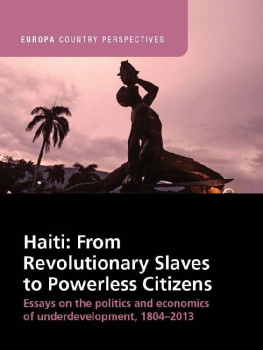Alex Dupuy - Rethinking the Haitian Revolution: Slavery, Independence, and the Struggle for Recognition
Here you can read online Alex Dupuy - Rethinking the Haitian Revolution: Slavery, Independence, and the Struggle for Recognition full text of the book (entire story) in english for free. Download pdf and epub, get meaning, cover and reviews about this ebook. City: Lanham, Maryland, year: 2019, publisher: Rowman & Littlefield Publishers, genre: History. Description of the work, (preface) as well as reviews are available. Best literature library LitArk.com created for fans of good reading and offers a wide selection of genres:
Romance novel
Science fiction
Adventure
Detective
Science
History
Home and family
Prose
Art
Politics
Computer
Non-fiction
Religion
Business
Children
Humor
Choose a favorite category and find really read worthwhile books. Enjoy immersion in the world of imagination, feel the emotions of the characters or learn something new for yourself, make an fascinating discovery.
- Book:Rethinking the Haitian Revolution: Slavery, Independence, and the Struggle for Recognition
- Author:
- Publisher:Rowman & Littlefield Publishers
- Genre:
- Year:2019
- City:Lanham, Maryland
- Rating:3 / 5
- Favourites:Add to favourites
- Your mark:
- 60
- 1
- 2
- 3
- 4
- 5
Rethinking the Haitian Revolution: Slavery, Independence, and the Struggle for Recognition: summary, description and annotation
We offer to read an annotation, description, summary or preface (depends on what the author of the book "Rethinking the Haitian Revolution: Slavery, Independence, and the Struggle for Recognition" wrote himself). If you haven't found the necessary information about the book — write in the comments, we will try to find it.
Alex Dupuy: author's other books
Who wrote Rethinking the Haitian Revolution: Slavery, Independence, and the Struggle for Recognition? Find out the surname, the name of the author of the book and a list of all author's works by series.
Rethinking the Haitian Revolution: Slavery, Independence, and the Struggle for Recognition — read online for free the complete book (whole text) full work
Below is the text of the book, divided by pages. System saving the place of the last page read, allows you to conveniently read the book "Rethinking the Haitian Revolution: Slavery, Independence, and the Struggle for Recognition" online for free, without having to search again every time where you left off. Put a bookmark, and you can go to the page where you finished reading at any time.
Font size:
Interval:
Bookmark:
Rethinking the Haitian Revolution
Slavery, Independence, and the
Struggle for Recognition
Alex Dupuy
Wesleyan University
ROWMAN & LITTLEFIELD
Lanham Boulder New York London
Published by Rowman & Littlefield
An imprint of The Rowman & Littlefield Publishing Group, Inc.
4501 Forbes Boulevard, Suite 200, Lanham, Maryland 20706
https://rowman.com
6 Tinworth Street, London SE11 5AL, United Kingdom
Copyright 2019 by The Rowman & Littlefield Publishing Group, Inc.
All rights reserved. No part of this book may be reproduced in any form or by any electronic or mechanical means, including information storage and retrieval systems, without written permission from the publisher, except by a reviewer who may quote passages in a review.
British Library Cataloguing in Publication Information Available
Library of Congress Cataloging-in-Publication Data
Names: Dupuy, Alex, author.
Title: Rethinking the Haitian Revolution : slavery, independence, and the struggle for recognition / Alex Dupuy, Wesleyan University.
Description: Lanham, MD : Rowman & Littlefield, [2019] | Includes bibliographical references and index.
Identifiers: LCCN 2018055317 (print) | LCCN 2018056427 (ebook) | ISBN 9781442261129 (ebook) | ISBN 9781442261105 (cloth : alk. paper) | ISBN 9781442261112 (pbk. : alk. paper)
Subjects: LCSH: HaitiHistoryRevolution, 17911804Influence. | HaitiHistoryRevolution, 17911804Economic aspects. | SlaveryEconomic aspectsHaiti. | SlaveryHaitiHistory18th century. | SlavesEmancipationHaitiHistory. | IndemnityFranceHistory. | HaitiEconomic conditions19th century. | Social classesHaiti. | HaitiRelationsFrance. | FranceRelationsHaiti.
Classification: LCC F1923 (ebook) | LCC F1923 .D87 2019 (print) | DDC 972.94/03dc23
LC record available at https://lccn.loc.gov/2018055317
 TM The paper used in this publication meets the minimum requirements of American National Standard for Information Sciences Permanence of Paper for Printed Library Materials, ANSI/NISO Z39.48-1992.
TM The paper used in this publication meets the minimum requirements of American National Standard for Information Sciences Permanence of Paper for Printed Library Materials, ANSI/NISO Z39.48-1992.
Printed in the United States of America
To Wanda

Robert Fatton Jr.
I am honored to write the foreword for this new book by my dearest colleague and friend, Alex Dupuy. Dupuy is one of those rare social scientists whose work consistently speaks the truth to power uncovering and demystifying the ugly structures of oppression. In his analysis of Haitian history, he has no patience with those forms of nationalism that hide the domestic sources of exploitation while exclusively blaming external causes for the countrys past and current predicament. This is not to say that Alex ignores the negative role played by imperial interferences in Haitis economy and politics, but rather that he underscores the ways in which such intrusions were welcomed by Haitian rulers in defense of their own corporate interests. In short, Haitian history has always been marked by an opportunistic convergence of interests between privileged domestic actors and powerful external agents.
Rethinking the Haitian Revolution: Slavery, Independence, and the Struggle for Recognition, like much of Alexs work, is grounded in a spirit of opposition and critique rather than accommodation. It represents an inspiration to those of us who believe that the challenge of the intellectual life is to be found in dissent against the status quo at a time when social science is increasingly becoming an apology for the dominant order. His study is informed by a profound humanism and empathy for those who suffer the ravages of exploitation.
Rethinking the Haitian Revolution offers a succinct and sophisticated analysis of the roles played by slavery, race, and class in the history of Haiti. Dupuy examines their complicated interconnections to explain the triumphs and failures of both the Haitian Revolution and the vicissitudes of the countrys political economy. He renews an old debate about the slave mode of production and its integration into the world capitalist economy. While he shows that slaverya most cruel and brutal form of unpaid laborgenerated an extremely productive sugar economy in Haiti during the early phases of world capitalist expansion, he argues convincingly that as capitalism matured, slavery and its legacy became obstacles to technological innovation and eventually curbed the development of an independent Haiti, and the Caribbean more broadly. Moreover, Dupuy critically examines how the Western Enlightenment, quintessentially distilled in the writings of Georg Wilhelm Friedrich Hegel, secreted a racist ideology that legitimated the exploitative slave plantation system. Contrary to certain contemporary interpretations of Hegels views, Dupuy argues forcefully that the master-slave relationship in Saint-Domingue was never one of mutual recognition. It was in fact a life-and-death struggle between two antagonistic actors that ended in a bloody slave revolution and the creation of an independent Haiti.
Haitis Revolution of 1804 represented a radical rupture with the white supremacist order of the time. It carried the egalitarian hopes of abolishing race as a marker of oppression and thus embodied a profoundly significant moment in world history. The revolution was, however, inhibited by both that very global order, and the intense processes of domestic class formation. In spite of these international constraints, Haitian rulers enjoyed a relative degree of autonomy in molding their patterns of governance; like all their counterparts in the world, they sought to advance their own class interests. Dupuy challenges the conventional wisdom that attributes many of Haitis early political and economic problems to the so-called indemnity debt forced on Haiti by the French government in 1825. In the face of French military threats, the Haitian regime of Jean-Pierre Boyer agreed to pay an indemnity of 150 million francs to France in return for its recognition of Haitis independence. Dupuy does not downplay the raw power of French imperialism in Haitis decision to pay the indemnity, nor does he suggest that the debt had no negative effects on the future development of the country, but he does insist convincingly that Boyers decision was largely determined by the class interests he represented. As Dupuy puts it, Boyer and the members of the ruling class believed that the property questioni.e., the properties of the former colonial owners that the revolutionary governments from Toussaint Louverture to Jean-Pierre Boyer confiscated and redistributed to create a new landed bourgeoisie in Haiticould be resolved. In short, Haitian rulers were determined to secure their newly acquired ownership of the land against any potential imperial encroachments by ensuring that France would recognize Haitis national sovereignty and thus respect its property laws. In addition, they assumedand rightly sothat once France had recognized Haitis independence, other major powers would follow.
Finally, Dupuy contends that what really prevented the economic development of Haiti was the incapacity of the Haitian ruling class to impose its hegemony over society in any systematic way. In other words, this classs continuing fragility and internecine conflicts blocked whatever meaningful economic and political projects it might have wanted to enact. It is true that such intraclass wranglings were, and still are, nurtured by imperial interventions in the domestic affairs of the country. Yet the reality is that Haitis ruling class has always lacked the material, ideological, and political attributes that have characterized classical bourgeoisies. It is unproductive, dependent, parasitic, and opportunistic.
Font size:
Interval:
Bookmark:
Similar books «Rethinking the Haitian Revolution: Slavery, Independence, and the Struggle for Recognition»
Look at similar books to Rethinking the Haitian Revolution: Slavery, Independence, and the Struggle for Recognition. We have selected literature similar in name and meaning in the hope of providing readers with more options to find new, interesting, not yet read works.
Discussion, reviews of the book Rethinking the Haitian Revolution: Slavery, Independence, and the Struggle for Recognition and just readers' own opinions. Leave your comments, write what you think about the work, its meaning or the main characters. Specify what exactly you liked and what you didn't like, and why you think so.












